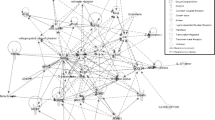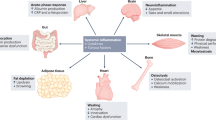Abstract
Introduction
Cancer cachexia is a severe debilitating disorder, which causes significant morbidity and mortality. In clinical practice, cachexia is often not treated until a late stage, when therapeutic options are limited.
Objective
It is therefore of great interest to analyse early biomarkers of this syndrome.
Conclusion
In this review article, we summarise recent biomarkers found in various body compartments. We also explore the likelihood of a genetic predisposition to cachexia and focus on the potential role of single nucleotide polymorphisms in genes coding for pro- and anti-inflammatory cytokines, and ‘atrogenes’ associated with wasting in skeletal muscle.

Similar content being viewed by others
References
Acharyya S, Butchbach ME, Sahenk Z, Wang H, Saji M, Carathers M, Ringel MD, Skipworth RJ, Fearon KC, Hollingsworth MA, Muscarella P, Burghes AH, Rafael-Fortney JA, Guttridge DC (2005) Dystrophin glycoprotein complex dysfunction: a regulatory link between muscular dystrophy and cancer cachexia. Cancer Cell 8:421–432
Argiles JM, Busquets S, Lopez-Soriano FJ (2003) Cytokines in the pathogenesis of cancer cachexia. Curr Opin Clin Nutr Metab Care 6:401–406
Argiles JM, Moore-Carrasco R, Fuster G, Busquets S, Lopez-Soriano FJ (2003) Cancer cachexia: the molecular mechanisms. Int J Biochem Cell Biol 35:405–409
Attaix D, Aurousseau E, Combaret L, Kee A, Larbaud D, Ralliere C, Souweine B, Taillandier D, Tilignac T (1998) Ubiquitin-proteasome-dependent proteolysis in skeletal muscle. Reprod Nutr Dev 38:153–165
Baracos VE (2006) Cancer-associated cachexia and underlying biological mechanisms. Annu Rev Nutr 26:435–461
Barber MD, Powell JJ, Lynch SF, Fearon KC, Ross JA (2000) A polymorphism of the interleukin-1 beta gene influences survival in pancreatic cancer. Br J Cancer 83:1443–1447
Barber MD, Powell JJ, Lynch SF, Gough NJ, Fearon KC, Ross JA (1999) Two polymorphisms of the tumour necrosis factor gene do not influence survival in pancreatic cancer. Clin Exp Immunol 117:425–429
Barton BE (2001) IL-6-like cytokines and cancer cachexia: consequences of chronic inflammation. Immunol Res 23:41–58
Bing C, Bao Y, Jenkins J, Sanders P, Manieri M, Cinti S, Tisdale MJ, Trayhurn P (2004) Zinc-alpha2-glycoprotein, a lipid mobilizing factor, is expressed in adipocytes and is up-regulated in mice with cancer cachexia. Proc Natl Acad Sci USA 101:2500–2505
Broekhuizen R, Grimble RF, Howell WM, Shale DJ, Creutzberg EC, Wouters EF, Schols AM (2005) Pulmonary cachexia, systemic inflammatory profile, and the interleukin 1beta -511 single nucleotide polymorphism. Am J Clin Nutr 82:1059–1064
Chlebowski RT, Heber D (1982) Hypogonadism in male patients with metastatic cancer prior to chemotherapy. Cancer Res 42:2495–2498
Deans C, Rose-Zerilli M, Wigmore S, Ross J, Howell M, Jackson A, Grimble R, Fearon K (2007) Host cytokine genotype is related to adverse prognosis and systemic inflammation in gastro-oesophageal cancer. Ann Surg Oncol 14:329–339
Deans C, Wigmore S, Paterson-Brown S, Black J, Ross J, Fearon KC (2005) Serum parathyroid hormone-related peptide is associated with systemic inflammation and adverse prognosis in gastroesophageal carcinoma. Cancer 103:1810–1818
Deans DA, Wigmore SJ, Gilmour H, Paterson-Brown S, Ross JA, Fearon KC (2006) Elevated tumour interleukin-1beta is associated with systemic inflammation: a marker of reduced survival in gastro-oesophageal cancer. Br J Cancer 95:1568–1575
DeJong CH, Busquets S, Moses AG, Schrauwen P, Ross JA, Argiles JM, Fearon KC (2005) Systemic inflammation correlates with increased expression of skeletal muscle ubiquitin but not uncoupling proteins in cancer cachexia. Oncol Rep 14:257–263
Falconer JS, Fearon KC, Ross JA, Elton R, Wigmore SJ, Garden OJ, Carter DC (1995) Acute-phase protein response and survival duration of patients with pancreatic cancer. Cancer 75:2077–2082
Fearon KC, Preston T (1990) Body composition in cancer cachexia. Infusionstherapie 17(Suppl 3):63–66
Fearon KC, Voss AC, Hustead DS (2006) Definition of cancer cachexia: effect of weight loss, reduced food intake, and systemic inflammation on functional status and prognosis. Am J Clin Nutr 83:1345–1350
Fishman D, Faulds G, Jeffery R, Mohamed-Ali V, Yudkin JS, Humphries S, Woo P (1998) The effect of novel polymorphisms in the interleukin-6 (IL-6) gene on IL-6 transcription and plasma IL-6 levels, and an association with systemic-onset juvenile chronic arthritis. J Clin Invest 102:1369–1376
Gervaziev YV, Kaznacheev VA, Gervazieva VB (2006) Allelic polymorphisms in the interleukin-4 promoter regions and their association with bronchial asthma among the Russian population. Int Arch Allergy Immunol 141:257–264
Hirai K, Hussey HJ, Barber MD, Price SA, Tisdale MJ (1998) Biological evaluation of a lipid-mobilizing factor isolated from the urine of cancer patients. Cancer Res 58:2359–2365
Hirschhorn JN, Lohmueller K, Byrne E, Hirschhorn K (2002) A comprehensive review of genetic association studies. Genet Med 4:45–61
Jagoe RT, Goldberg AL (2001) What do we really know about the ubiquitin-proteasome pathway in muscle atrophy? Curr Opin Clin Nutr Metab Care 4:183–190
Kleinrath T, Gassner C, Lackner P, Thurnher M, Ramoner R (2007) Interleukin-4 promoter polymorphisms: a genetic prognostic factor for survival in metastatic renal cell carcinoma. J Clin Oncol 25:845–851
Lecker SH, Solomon V, Mitch WE, Goldberg AL (1999) Muscle protein breakdown and the critical role of the ubiquitin-proteasome pathway in normal and disease states. J Nutr 129:227S–237S
Mahmoud FA, Rivera NI (2002) The role of C-reactive protein as a prognostic indicator in advanced cancer. Curr Oncol Rep 4:250–255
Martignoni ME, Kunze P, Hildebrandt W, Kunzli B, Berberat P, Giese T, Kloters O, Hammer J, Buchler MW, Giese NA, Friess H (2005) Role of mononuclear cells and inflammatory cytokines in pancreatic cancer-related cachexia. Clin Cancer Res 11:5802–5808
McPherron AC, Lee SJ (1997) Double muscling in cattle due to mutations in the myostatin gene. Proc Natl Acad Sci USA 94:12457–12461
Pfitzenmaier J, Vessella R, Higano CS, Noteboom JL, Wallace D Jr, Corey E (2003) Elevation of cytokine levels in cachectic patients with prostate carcinoma. Cancer 97:1211–1216
Pisters PW, Cersosimo E, Rogatko A, Brennan MF (1992) Insulin action on glucose and branched-chain amino acid metabolism in cancer cachexia: differential effects of insulin. Surgery 111:301–310
Pociot F, Molvig J, Wogensen L, Worsaae H, Nerup J (1992) A TaqI polymorphism in the human interleukin-1 beta (IL-1 beta) gene correlates with IL-1 beta secretion in vitro. Eur J Clin Invest 22:396–402
Sacheck JM, Hyatt JP, Raffaello A, Jagoe RT, Roy RR, Edgerton VR, Lecker SH, Goldberg AL (2007) Rapid disuse and denervation atrophy involve transcriptional changes similar to those of muscle wasting during systemic diseases. FASEB J 21:140–155
Sanders PM, Russell ST, Tisdale MJ (2005) Angiotensin II directly induces muscle protein catabolism through the ubiquitin-proteasome proteolytic pathway and may play a role in cancer cachexia. Br J Cancer 93:425–434
Schaaf BM, Boehmke F, Esnaashari H, Seitzer U, Kothe H, Maass M, Zabel P, Dalhoff K (2003) Pneumococcal septic shock is associated with the interleukin-10–1082 gene promoter polymorphism. Am J Respir Crit Care Med 168:476–480
Schaur RJ, Fellier H, Gleispach H, Fink E, Kronberger L (1979) Tumor host relations. I. Increased plasma cortisol in tumor-bearing humans compared with patients with benign surgical diseases. J Cancer Res Clin Oncol 93:281–285
Schuelke M, Wagner KR, Stolz LE, Hubner C, Riebel T, Komen W, Braun T, Tobin JF, Lee SJ (2004) Myostatin mutation associated with gross muscle hypertrophy in a child. N Engl J Med 350:2682–2688
Shimizu Y, Nagaya N, Isobe T, Imazu M, Okumura H, Hosoda H, Kojima M, Kangawa K, Kohno N (2003) Increased plasma ghrelin level in lung cancer cachexia. Clin Cancer Res 9:774–778
Skipworth RJ, Stewart GD, Ross JA, Guttridge DC, Fearon KC (2006) The molecular mechanisms of skeletal muscle wasting: implications for therapy. Surgeon 4:273–283
Stewart GD, Skipworth RJ, Fearon KC (2006) Cancer cachexia and fatigue. Clin Med 6:140–143
Stoneking M (2001) Single nucleotide polymorphisms. From the evolutionary past. Nature 409:821–822
Tisdale MJ (1997) Biology of cachexia. J Natl Cancer Inst 89:1763–1773
Tisdale MJ (1997) Cancer cachexia: metabolic alterations and clinical manifestations. Nutrition 13:1–7
Tisdale MJ (2002) Cachexia in cancer patients. Nat Rev Cancer 2:862–871
Tisdale MJ (2004) Cancer cachexia. Langenbecks Arch Surg 389:299–305
Tisdale MJ, Brennan RA, Fearon KC (1987) Reduction of weight loss and tumour size in a cachexia model by a high fat diet. Br J Cancer 56:39–43
Todorov P, Cariuk P, McDevitt T, Coles B, Fearon K, Tisdale M (1996) Characterization of a cancer cachectic factor. Nature 379:739–742
Todorov PT, McDevitt TM, Meyer DJ, Ueyama H, Ohkubo I, Tisdale MJ (1998) Purification and characterization of a tumor lipid-mobilizing factor. Cancer Res 58:2353–2358
Tracey KJ, Cerami A (1993) Tumor necrosis factor, other cytokines and disease. Annu Rev Cell Biol 9:317–343
Vuoristo MS (2007) The polymorphisms of interleukin-10 gene influence the prognosis of patients with advanced melanoma. Cancer Genet Cytogenet 176:54–57
Wieland BM, Stewart GD, Skipworth RJ, Sangster K, Fearon KC, Ross JA, Reiman TJ, Easaw J, Mourtzakis M, Kumar V, Pak BJ, Calder K, Filippatos G, Kremastinos DT, Palcic M, Baracos VE (2007) Is there a human homologue to the murine proteolysis-inducing factor? Clin Cancer Res 13:4984–4992
Wigmore SJ, Plester CE, Ross JA, Fearon KC (1997) Contribution of anorexia and hypermetabolism to weight loss in anicteric patients with pancreatic cancer. Br J Surg 84:196–197
Wilson AG, Symons JA, McDowell TL, McDevitt HO, Duff GW (1997) Effects of a polymorphism in the human tumor necrosis factor alpha promoter on transcriptional activation. Proc Natl Acad Sci USA 94:3195–3199
Wolf I, Sadetzki S, Kanely H, Kundel Y, Pariente C, Epstein N, Oberman B, Catane R, Kaufman B, Shimon I (2006) Adiponectin, ghrelin, and leptin in cancer cachexia in breast and colon cancer patients. Cancer 106:966–973
Zhang D, Zheng H, Zhou Y, Tang X, Yu B, Li J (2007) Association of IL-1beta gene polymorphism with cachexia from locally advanced gastric cancer. BMC Cancer 7:45
Author information
Authors and Affiliations
Corresponding author
Additional information
An erratum to this article can be found at http://dx.doi.org/10.1007/s00520-008-0414-4
Rights and permissions
About this article
Cite this article
Tan, B.H.L., Deans, D.A.C., Skipworth, R.J.E. et al. Biomarkers for cancer cachexia: is there also a genetic component to cachexia?. Support Care Cancer 16, 229–234 (2008). https://doi.org/10.1007/s00520-007-0367-z
Received:
Accepted:
Published:
Issue Date:
DOI: https://doi.org/10.1007/s00520-007-0367-z




